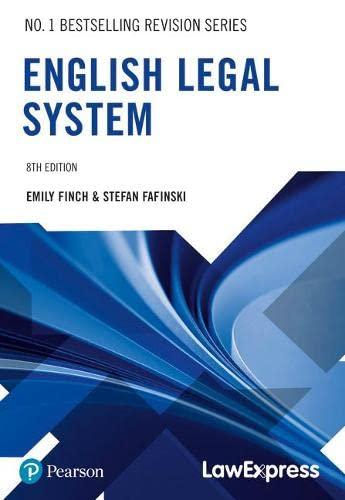Question
ABC Loans Inc. won a lawsuit. It has a judgment for $100,000 and a legal bill of $45,698.12 that is owed to its lawyer for
ABC Loans Inc. won a lawsuit. It has a judgment for $100,000 and a legal bill of $45,698.12 that is owed to its lawyer for legal services to obtain this judgment. Which of the following are correct?
Question 1 options:
1)
The remedy ABC Loans Inc. could use to seize money from a bank account is called seizure.
2)
If the judgment debtor is an individual whose assets are worth less than $100,000, ABC Loans Inc. can seize all of the individual's assets to pay its judgment.
3)
If the judgment debtor is a corporation whose assets are worth less than $100,000, ABC Loans Inc. can seize all of the corporation's assets to pay its judgment.
4)
The amount that the judgment debtor must pay is $145,698.12, the total of the judgment and the winner's legal fees.
5)
If the judgment debtor is not able to pay the amount owing, they won't go to jail.
6)
If the judgment debtor is not able to pay the amount owing, ABC Loans Inc. can collect from the public fund that has been established for these types of situations.
Question 2(1 point)
I lost a lawsuit in Court of Queen's Bench and want to appeal. I am called the:
Question 2 options:
1)
Claimant
2)
Plaintiff
3)
Litigator
4)
Appellant
Question 3(1 point)
Ranald is involved in a lawsuit in which he has been sued for a traffic accident. He claims the accident was not his fault and that the other driver caused him $97,999 of damages. The document he must file in this lawsuit to make this claim for damages is called
Question 3 options:
1)
a Counterclaim
2)
a Statement of Claim
3)
a Statement of Defence
4)
a Pleading
5)
None of the above
Question 4(1 point)
Which of the following is an example of special damages?
Question 4 options:
1)
pain and suffering
2)
loss of enjoyment of life
3)
loss of life expectancy
4)
ambulance costs
Question 5(1 point)
Which of the following is FALSE?
Question 5 options:
1)
The tort of negligence is the most common of the torts that arise in a business context.
2)
Intentional torts are harmful acts that are committed on purpose.
3)
The defendant in a civil action must prove his or her innocence beyond a reasonable doubt.
4)
Damages for pain and suffering are an example of general damages.
Question 6(1 point)
A bar over-served a customer with alcohol who then drove their vehicle while intoxicated. To whom does the bar owe a duty of care in this situation?
Question 6 options:
1)
the customer while they are in the bar only
2)
the customer while they are driving home only
3)
the passengers in the customer's car and other users of the road only
4)
the customer while they are in the bar and while they are driving home, the passengers in the customer's car and other users of the road
5)
All of the above and the taxpayers
Question 7(1 point)
The business of Helpmates Care Services involves supplying nurses and home care workers to visit elderly and disabled individuals in their homes to provide nursing and personal care. One of Helpmates' staff went to work knowing she had a high fever, and later tested positive for COVID 19. The client contracted COVID 19 and had to be hospitalized as a result. Which statement best describes the actions of the worker?
Question 7 options:
1)
The defendant breached the standard of care owed to the patient.
2)
The defendant breached the duty of care owed to the government.
3)
The defendant purposely caused the loss.
4)
The defendant's conduct was accidental and therefore the defendant cannot be sued for negligence.
Question 8(1 point)
When a court asks, "Did the defendant behave in the manner of a reasonable person?" what aspect of the tort of negligence is the court considering?
Question 8 options:
1)
Did the defendant owe a duty of care?
2)
Did the defendant breach the standard of care?
3)
Did the plaintiff sustain damage?
4)
Is the damage too remote?
Question 9(1 point)
Which of the following is synonymous in negligence law with the statement "it is not enough to establish some of the steps or even most of them"?
Question 9 options:
1)
the plaintiff's requirement to prove each and every step
2)
the neighbour principle
3)
the plaintiff's automatic entitlement to damages
4)
the right to recover a loss of income
Question 10(1 point)
Which of the following is FALSE?
Question 10 options:
1)
Manufacturers are held in tort law to owe a duty to consumers of their products
2)
Accountants are held in tort law to owe a duty to their customers
3)
Financial planners are held in tort law to owe a duty to anyone to whom they give free advice
4)
None of these are false, all of these are held in tort law to owe a duty
Step by Step Solution
There are 3 Steps involved in it
Step: 1

Get Instant Access to Expert-Tailored Solutions
See step-by-step solutions with expert insights and AI powered tools for academic success
Step: 2

Step: 3

Ace Your Homework with AI
Get the answers you need in no time with our AI-driven, step-by-step assistance
Get Started


